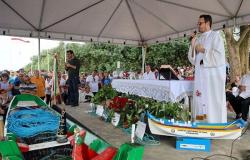The event continues until Friday, the 5th, with free entry to the debates in the auditorium of the Institute of Social Security Management and Social Protection of Pará
The State Secretariat for Racial Equality and Human Rights (Seirdh) began, on Monday, the 1st, the “Seminar on the 60th anniversary of the 1964 civil-military coup”, which continues until Friday, the 5th, with programming at auditorium of the Institute of Social Security Management and Social Protection of the State of Pará (IGEPPS) and in the rooms of the Postgraduate Program in History at the Federal University of Pará (PPHist/UFPA).
The first day of the seminar was marked by the placement of a plaque, at Casa das Onze Janelas, as the first landmark, in the State, of a place where the military dictatorship operated. What today is a tourist, leisure and contemporary art dissemination complex, in the past, the building of Casa das Onze Janelas was a barracks and a recognized place where human rights were violated, such as arrests and torture of opponents of the dictatorial regime, which began with the coup in 1964.
“This plaque gives us, at the same time, joy, because it marks this place, but also sadness, because it reminds us that people were arrested and tortured here. One of the characteristics we have, in Brazil and Pará, is the invisibility of the places that served for illegal imprisonment, torture and as a starting point for the forced disappearances of that country. So, this plaque is very important. Let it serve as reflection”, highlighted the head of Seirdh, Jarbas Vasconcelos.
 The moment was attended by several authorities linked to the issue of dictatorship at a national level and who are in Belém for the program. This is the case of journalist Paulo Vannuchi, former Minister of Human Rights; former deputy José Genoíno Netto; the former president of the Brazilian Bar Association (OAB), Cezar Britto, and the current National Secretary for Consumer Rights, Wadih Damous. The Secretary of State for Culture, Úrsula Vidal, and the mayor of Belém, Edmilson Rodrigues, were also present.
The moment was attended by several authorities linked to the issue of dictatorship at a national level and who are in Belém for the program. This is the case of journalist Paulo Vannuchi, former Minister of Human Rights; former deputy José Genoíno Netto; the former president of the Brazilian Bar Association (OAB), Cezar Britto, and the current National Secretary for Consumer Rights, Wadih Damous. The Secretary of State for Culture, Úrsula Vidal, and the mayor of Belém, Edmilson Rodrigues, were also present.
 During the program, the Secretary of State for Racial Equality and Human Rights, Jarbas Vasconcelos, also signed the ordinance that designates the members who will compose the Committee for the selection of nominees for the “Egydio Machado Salles Filho for the Defense of Human Rights” Award, recently established by Seirdh and which must be delivered annually in December.
During the program, the Secretary of State for Racial Equality and Human Rights, Jarbas Vasconcelos, also signed the ordinance that designates the members who will compose the Committee for the selection of nominees for the “Egydio Machado Salles Filho for the Defense of Human Rights” Award, recently established by Seirdh and which must be delivered annually in December.
 On the occasion, former deputy José Genoíno and professor Edilza Fontes, who is also deputy secretary of Seirdh, launched books about the years of the dictatorship in Brazil.
On the occasion, former deputy José Genoíno and professor Edilza Fontes, who is also deputy secretary of Seirdh, launched books about the years of the dictatorship in Brazil.
 Debates – Before, throughout the day, debates and round tables were held to discuss topics inherent to the civil-military coup in Brazil. Early on, at the opening of the event, local and national guests recounted episodes from their private lives in which they had some contact with the experience of the dictatorship.
Debates – Before, throughout the day, debates and round tables were held to discuss topics inherent to the civil-military coup in Brazil. Early on, at the opening of the event, local and national guests recounted episodes from their private lives in which they had some contact with the experience of the dictatorship.
“Certainly, if we were gathered on April 1, 1964, as we are here today, we would all be arrested, because, at that moment, anyone who dared to stand up for social advances could be arrested, tortured, disappeared”, he recalled. the former president of the OAB, Cezar Britto.
“I congratulate Pará for this brilliant event, which adds to others held throughout Brazil and which aims not to dwell on the past, but to process what happened and transform the trauma of pain and violation into a process of consciousness”, observed the journalist and former Minister of Human Rights, Paulo Vannuchi.
The chief of staff of the Government of Pará, Carlos Kayath, was also one of the speakers at the event. He recalled the history of the family, which had some members arrested by the military dictatorship in Pará. This is the case of his father and great-uncle. “The Government of Pará supports the initiative of Seirdh and Secult (Secretariat of State for Culture) to remember this fact, so that it is not repeated. Back in the 60s, my house in Belém was invaded and my father was arrested. He, who was a professor at the Federal University, never managed to return to his position”, he lamented.
Representative Carlos Bordalo, who represented the Legislative Assembly of Pará (Alepa) at the event, highlighted the consequences of the civil-military coup to this day for Brazilian society. “We have a gigantic task, which is popular education, which is to take historical memory to schools, which still do not satisfactorily discuss the meaning of this moment, which was the military dictatorship”, he stressed.
 The program also included a lecture by the Argentine historian Hernán Ramiro Ramírez, who discussed aspects of the military dictatorships implemented in South America and a panel that debated the process of building the 1988 Citizen Constitution and the Amnesty Law in Brazil.
The program also included a lecture by the Argentine historian Hernán Ramiro Ramírez, who discussed aspects of the military dictatorships implemented in South America and a panel that debated the process of building the 1988 Citizen Constitution and the Amnesty Law in Brazil.
Continuity – The event continues until Friday, the 5th, with free entry to all tables and debates. Until Wednesday, the 3rd, they take place in the IGEPPS auditorium, from 9am to 6pm, and, on Thursday and Friday, the 4th and 5th, in the PPHist/UFPA rooms. The exhibition “Memórias da Ditadura” is also on display at Casa das Onze Janelas, until April 15th, in partnership with Secult.
Tags: Seirdh holds Seminar #60th anniversary CivilMilitary Coup week
--














